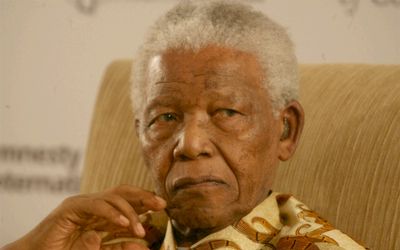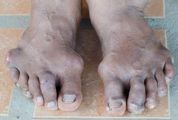THE candle on the floor of prisoner number 466/64’s cell on Robben Island shone brightly throughout the day yesterday as hundreds of visitors passed by to pay homage to Nelson Mandela, who had been its occupant for 18 years.
The neatly folded blankets on a felt cloth mattress on the floor, a stool, a toilet bucket, a bowl and a tin mug were the poignant reminders of the great personal sacrifice that Mandela made in pursuit of his ideal of a free, non-racial society. This is an ideal that was nurtured in the midst of the barren aridity of the windswept and rocky outcrop and which like the candle in his cell will continue to illuminate the lives of those who follow in his footsteps.
The small confines of the heavily barred cell contrasted with the grandness of the spirit that lived within its walls, what it had been and what it was to become, a spirit that defied all attempts to crush it throughout Mandela’s 18 years on the island and the additional nine in Pollsmoor and Victor Verster prisons.
Not even the forced labour in the lime quarry where Mandela and his fellow inmates were made to crush stones day after day in the blazing sun and the freezing cold could diminish his fighting spirit. Yesterday, the only sign of life in the abandoned and desolate pit of despair was a lone steenbok seeking shade from the midday sun under a crevice.
Many of the visitors, tourists for the most part from regions of the world as far apart as Las Vegas and Afghanistan, had booked their trips to the island long in advance of the news of Mandela’s death, but his passing a few days beforehand served to heighten their sense of indebtedness and gratitude to the man. It also underlined their obligation to pay homage to him.
"It is a great honour for me to visit Robben Island," said Princess Dlamini from Newcastle in Kwa-Zulu-Natal.
Her husband, Vusi Dlamini, said the visit was meant "to honour those who suffered for justice and freedom in our land and who helped to build our land. For us it is about peace, prosperity and reconciliation. We feel very, very sad about his death because we don’t know when we are going to get the very same leader like Nelson Mandela."
Another strong sentiment, as expressed by a church minister from Harding, was that Mr Mandela had "done a lot of work for us" and now it was time for him to rest. The minister’s son, Nkosi Mbuthuma, said he was visiting the island to celebrate Mandela.
"He has died. He was an old man. I think it is his time to rest in peace. He worked for us so much, he did so many things for us, so today we are not crying anymore but we want to celebrate his life."
Newcastle-based Sbongiseni Zungu said it was a "great thing" to have had Mandela in this world. He had been planning his visit to Robben Island for more than 10 years and it was "a dream come true" to finally be going there.
Carla Bates from Las Vegas, the US, said as an African-American it was "part of our journey" to pay her respects to Mandela.
"Strength, dignity, respect, courage, perseverance, endurance — all of those wonderful attributes belong to him", she said.
A district administrator from Uganda, Yusuf Ssenteza, who was in Cape Town for a conference, said he was shocked to learn of Mandela’s death.
"He was a great leader, comparable to none. He was a unifying factor, a real model for South Africa, Africa and the world. He is a symbol for unity, for development and for reconciliation," he said.
Belgian Leen De Mets was determined to make the trip before her departure from South Africa last night. "We felt we had to do it to honour Mandela as a world leader."
Robben Island bus guide Elias Salie said it was no use feeling sad and shedding tears, but to live the example he set for us would be to truly honour Mandela.
"Now that he is no longer here I feel more conscious about this. We need to look inside ourselves and see what we can change in order to be that example he set for us."
Rosaline Mashikinya of Soshanguve said Mandela was important as "he did so many things for us", even managing to smile after spending 27 years in prison. "That is why I like him so much. We’ve lost a great leader."
Maximum security prison guide Sipho Msomi, who spent five years on the island in the 1980s, perhaps summed everything up when he said: "He made us realise how a human being must be to be a human being."
And then it was farewell as the ferry made its way back to Cape Town and the island receded into the distance.

Former president Nelson Mandela. Picture: SUNDAY WORLD
THE candle on the floor of prisoner number 466/64’s cell on Robben Island shone brightly throughout the day yesterday as hundreds of visitors passed by to pay homage to Nelson Mandela, who had been its occupant for 18 years.
The neatly folded blankets on a felt cloth mattress on the floor, a stool, a toilet bucket, a bowl and a tin mug were the poignant reminders of the great personal sacrifice that Mandela made in pursuit of his ideal of a free, non-racial society. This is an ideal that was nurtured in the midst of the barren aridity of the windswept and rocky outcrop and which like the candle in his cell will continue to illuminate the lives of those who follow in his footsteps.
The small confines of the heavily barred cell contrasted with the grandness of the spirit that lived within its walls, what it had been and what it was to become, a spirit that defied all attempts to crush it throughout Mandela’s 18 years on the island and the additional nine in Pollsmoor and Victor Verster prisons.
Not even the forced labour in the lime quarry where Mandela and his fellow inmates were made to crush stones day after day in the blazing sun and the freezing cold could diminish his fighting spirit. Yesterday, the only sign of life in the abandoned and desolate pit of despair was a lone steenbok seeking shade from the midday sun under a crevice.
Many of the visitors, tourists for the most part from regions of the world as far apart as Las Vegas and Afghanistan, had booked their trips to the island long in advance of the news of Mandela’s death, but his passing a few days beforehand served to heighten their sense of indebtedness and gratitude to the man. It also underlined their obligation to pay homage to him.
"It is a great honour for me to visit Robben Island," said Princess Dlamini from Newcastle in Kwa-Zulu-Natal.
Her husband, Vusi Dlamini, said the visit was meant "to honour those who suffered for justice and freedom in our land and who helped to build our land. For us it is about peace, prosperity and reconciliation. We feel very, very sad about his death because we don’t know when we are going to get the very same leader like Nelson Mandela."
Another strong sentiment, as expressed by a church minister from Harding, was that Mr Mandela had "done a lot of work for us" and now it was time for him to rest. The minister’s son, Nkosi Mbuthuma, said he was visiting the island to celebrate Mandela.
"He has died. He was an old man. I think it is his time to rest in peace. He worked for us so much, he did so many things for us, so today we are not crying anymore but we want to celebrate his life."
Newcastle-based Sbongiseni Zungu said it was a "great thing" to have had Mandela in this world. He had been planning his visit to Robben Island for more than 10 years and it was "a dream come true" to finally be going there.
Carla Bates from Las Vegas, the US, said as an African-American it was "part of our journey" to pay her respects to Mandela.
"Strength, dignity, respect, courage, perseverance, endurance — all of those wonderful attributes belong to him", she said.
A district administrator from Uganda, Yusuf Ssenteza, who was in Cape Town for a conference, said he was shocked to learn of Mandela’s death.
"He was a great leader, comparable to none. He was a unifying factor, a real model for South Africa, Africa and the world. He is a symbol for unity, for development and for reconciliation," he said.
Belgian Leen De Mets was determined to make the trip before her departure from South Africa last night. "We felt we had to do it to honour Mandela as a world leader."
Robben Island bus guide Elias Salie said it was no use feeling sad and shedding tears, but to live the example he set for us would be to truly honour Mandela.
"Now that he is no longer here I feel more conscious about this. We need to look inside ourselves and see what we can change in order to be that example he set for us."
Rosaline Mashikinya of Soshanguve said Mandela was important as "he did so many things for us", even managing to smile after spending 27 years in prison. "That is why I like him so much. We’ve lost a great leader."
Maximum security prison guide Sipho Msomi, who spent five years on the island in the 1980s, perhaps summed everything up when he said: "He made us realise how a human being must be to be a human being."
And then it was farewell as the ferry made its way back to Cape Town and the island receded into the distance.
























